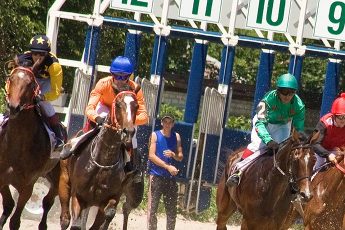Horse betting guide part 1: How to bet on horses
Horse betting guide part 3: A guide to the different types of full cover bets
Horse betting guide part 4: What is totepool betting?
Horse betting guide part 5: Tips for picking a winning horse
Many betting markets are available on horse racing in the UK and the terminology alone can be intimidating for some. Here we look at some of the key markets and the jargon to help you get to grips with it.
Win, Place and Each-Way
Win bets are single bets you place on a horse to win a specific race. Only the selected horse winning the race will yield a return.
The overall return will always include the stake. If you place a £5 wager on a horse at 3/1 and it wins, the return will be £20.00 (3/1 x £5 plus £5 stake).
Upon making the bet, you will be given a choice of ‘taking the price’ or leaving it to the SP (starting price). Taking the price means that you are committing to the bet at whatever odds the horse is trading at the time of the bet.
This is a balancing act for a punter. The horse may be 3/1 when you place the bet but may eventually start at a bigger price. This means you may have missed out on a potentially larger return.
Naturally though it can go the other way; with a horse with plenty of backing just before the race naturally shortening in price. To counter this, most online bookmakers offer ‘best odds guaranteed’, meaning you should take the price when placing the bet and if the SP is larger, you will receive your winnings at that price anyway and so you have nothing to lose by taking the price.
A ‘place’ bet is something which catches some punters out. In the USA, for example, you can back a horse to ‘win, place or show’. When backing it to ‘place’, it may win or finish 2nd for you to collect a return.
In the UK, what constitutes a ‘place’ is much more fluid. It largely depends on the conditions of the race and the number of runners.
These are the standard rules in the UK:
1-4 runners – the horse must win to have reached a ‘place’
5-7 runners – the horse must finish in the first two
8+ runners – the horse must finish in the first three
16+ runners – the horse must finish in the first four in handicap* races only
Injuries can occur at any time to a horse and with their best interests at heart as an animal, not just an asset; owners and trainers will usually not hesitate to pull a horse out of a race at any time.
Changes in racing weight can occur too. In the Grand National which is a handicap race; the theory is that all horses will have an equal chance. However, it’s generally the case that the more weight the horse is carrying, the harder it will be to win.
As a punter, you may fancy a horse’s chances Ante Post. You might believe there are plenty of other horses above it in the handicap. Therefore, your horse may be capable of carrying say, 10st 7lbs. If enough of the better horses drop out, your horse will move up the handicap appropriately and therefore may end up carrying well over 11st which may spoil its chances.
